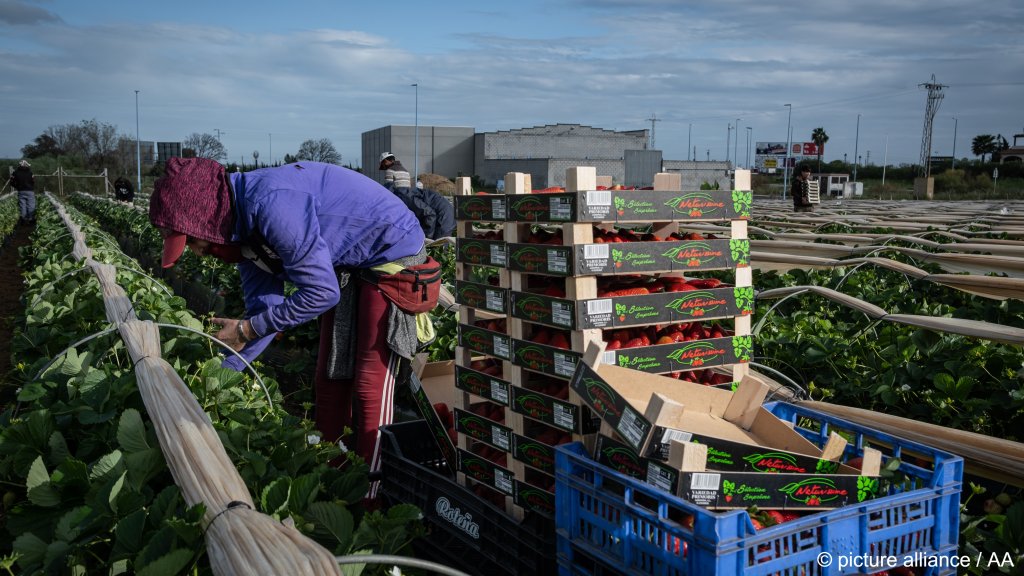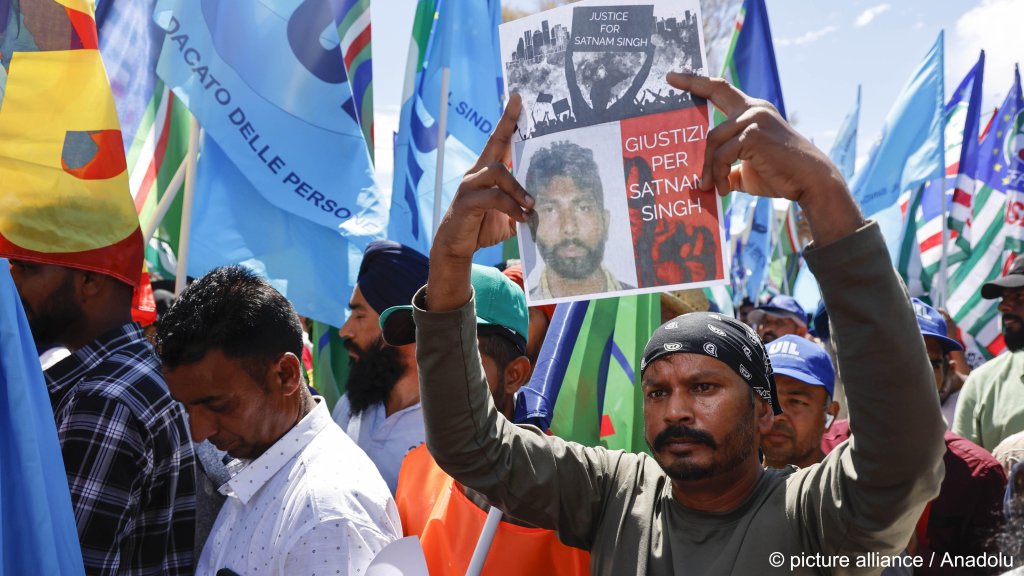On November 19, the European Council adopted a regulation to ban products made using forced labor from being sold, imported, or exported from the EU, including products made inside the EU. Could this have implications for Europe’s agricultural sector, where the exploitation of undocumented migrant workers has been a longstanding concern?
A documentary by Germany's international broadcaster Deutsche Welle, "Blood, Sweat, and Greens", explores the harsh realities of agriculture in Italy, Greece, and Spain, revealing how plummeting market prices driven by supermarket monopolies are squeezing farmers' profits and forcing wage cuts for migrant laborers.
In Calabria, Italy, the documentary shows how most of the oranges are picked by migrant workers like Seydou from Mali who entered Europe by crossing the Mediterranean. Seydou has no papers and no work contract. He is not guaranteed a minimum wage and is paid by the crate. On some days when there are inspections, he has to hide. He cannot fill as many crates with his harvest and does not earn as much. He and other workers live in accommodations that have no water or electricity.
Nello, the owner of the orange farm has been struggling to maintain a decent profit margin. Between paying taxes and production costs, he says that farmers like him have no choice but to cut down on wages, pay workers off the books, or simply quit.
"In the end, I am just working for honor and glory," said Nello, who added that his produce should have a price tag showing how much the farmers earn so consumers can see "who is exploiting who."
Millions of olive trees, with no one to pick them
In Kalamata, Greece, a man who is named only as Costas oversees 7,000 olive trees. He estimates that there are about 3-4 million olive trees that need about 15,000 workers who can harvest the olives in two months.
There are not enough local workers to do this so Costas goes to a part of town where every day, at about 6-7 am, men who are usually from Pakistan who have crossed the Aegean Sea on rubber boats wait around, hoping they will be offered a job. Costas risks a fine of thousands of euros for transporting an undocumented worker to the olive farm.
One Pakistani worker says that he wishes he could be like colleagues from Albania who have temporary working visas.
In another part of southern Europe, in Huelva, Spain, women from Morocco pick strawberries during the months of the harvest season before going back home. Under a bilateral agreement between the two countries, Moroccan women like Baheisa can work and send money to her family.
"Hard work is not a problem for me. I can pick strawberries, heavy things, even rocks if it means putting smiles on the faces of family back home," she said.
In 2023, the agricultural sector in the European Union brought in an estimated 537.1 billion euros in goods. The sector is the largest employer in the bloc with over 8.7 million people working in agriculture and other related industries such as crop and animal production.
According to a study by the International Labour Organization (ILO), in the last decade, the proportion of victims trafficked for labor exploitation and forced labor reported in the EU member states has increased to approximately 40 percent of all victims of trafficking. Over 70 percent of adults trafficked for forced labor in agriculture, domestic work or manufacturing are in debt bondage.
Read AlsoGreece: How to apply for a seasonal work visa

Eradicating forced labor in supply chains
On November 19, the Council of the European Union announced the adoption of a regulation that would ban the sale, import, and export of products made with forced labor.
A source at the Council of the European Union confirmed to InfoMigrants that the regulation will apply to both products made within the EU and products that are made outside the EU and imported into the bloc.
The European Union's new Forced Labor Regulation will apply to products made within the EU as well as those imported from outside the bloc. The regulation prohibits placing or exporting goods made with forced labor at any stage of their production, harvest, or manufacturing process. It covers all sectors, including agriculture, ensuring no products tied to forced labor reach the EU market.
The regulation is based on the definitions of forced labor outlined by the ILO: "all work or service which is exacted from any person under the threat of a penalty and for which the person has not offered himself or herself voluntarily." It includes forced child labor and state-imposed forced labor, which are outlined in ILO Conventions 29 and 105.
In the case of suspected forced labor used for products, investigations will differ based on the origin of the product, said the Council of the European Union source.
For suspected forced labor in EU-made products, member states will lead investigations. For imported goods, the European Commission will handle inquiries. If violations are confirmed, authorities will impose immediate bans on the sale and export of the products, with orders for their removal from the market and proper disposal, prioritizing recycling or rendering them inoperable.
On its website, the European Council stated that once the Forced Labor Regulation is signed by the President of the European Parliament and the President of the Council, the regulation will be published in the Official Journal of the European Union and will enter into force. Implementation of the regulation will be three years after the date of entry into force.
Read AlsoItaly: Two alleged gangmasters arrested for 'enslaving farmhands'

A step in the right direction
The International Labour Organization (ILO) estimates that globally, about 17.3 million people are victims of forced labor exploitation. Five sectors account for about 87 percent of adult people working in conditions of forced labor: agriculture (excluding fishing), manufacturing, construction, services, and domestic work.
The study further adds that the share of migrants in the group of people in forced labor is much higher compared to the share of migrants who are part of the overall labor force.
Charles Autheman, a lecturer of Business and Human Rights at the HEC Business School in Paris called the EU Forced Labor Regulation "a step in the right direction" in holding companies accountable for maintaining ethical supply chain practices but stressed that implementation of the regulation should be vigilantly monitored.
"You have 27 member states who will implement this and another body, the European Commission, overseeing it. There will be as many different levels of interpretation, willingness, and sensitivity to the issue of forced labor. The implementation of this regulation must not push workers into deeper states of vulnerability," Autheman told InfoMigrants.
In a statement, Human Rights Watch said that the regulation would complement the adoption of the EU Corporate Sustainability Due Diligence Directive which requires corporations to set up due diligence processes to identify environmental damages and human rights abuses throughout their supply chains.
Read AlsoToo hot to work: How global warming is affecting agricultural workers in Europe
